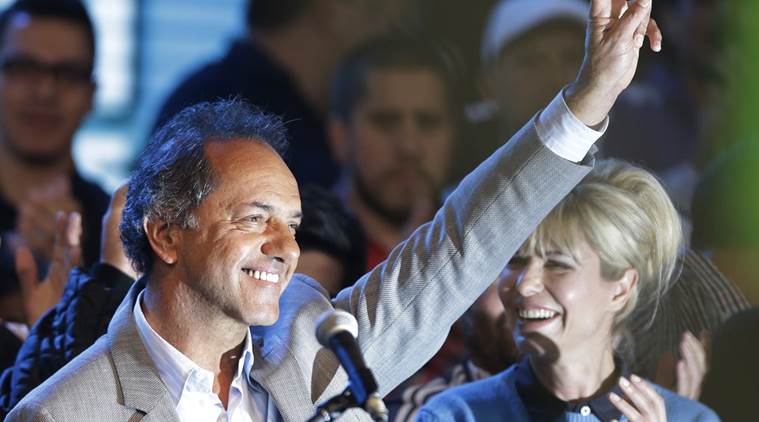Opinion The end of Kirchnerismo
President Cristina de Kirchner's handpicked successor, Daniel Scioli, governor of Buenos Aires province, faces Mauricio Macri, mayor of Buenos Aires city, in the run-off.
 Ruling party presidential candidate Daniel Scioli makes a victory sign during a closing campaign rally in La Matanza, in the outskirts of Buenos Aires, Argentina, Thursday, Nov. 19, 2015. Scioli will face opposition candidate Mauricio Macri in a Nov. 22 runoff. (AP Photo/Ricardo Mazalan)
Ruling party presidential candidate Daniel Scioli makes a victory sign during a closing campaign rally in La Matanza, in the outskirts of Buenos Aires, Argentina, Thursday, Nov. 19, 2015. Scioli will face opposition candidate Mauricio Macri in a Nov. 22 runoff. (AP Photo/Ricardo Mazalan)  Ruling party presidential candidate Daniel Scioli makes a victory sign during a closing campaign rally in La Matanza, in the outskirts of Buenos Aires, Argentina. (Source: AP photo)
Ruling party presidential candidate Daniel Scioli makes a victory sign during a closing campaign rally in La Matanza, in the outskirts of Buenos Aires, Argentina. (Source: AP photo)
Argentina’s first-ever presidential run-off on Sunday, November 22, has people in the country and Latin America at the edge of their seats. One thing is certain: We are nearing the end of “Kirchnerismo”, marked by the 12-year rule of the late Néstor Kirchner (2003-07) and his wife, Cristina Fernández de Kirchner (2007-15). Due to a constitutional limit of two consecutive terms, President Cristina de Kirchner cannot contest. Her handpicked successor, Daniel Scioli, governor of Buenos Aires province, faces Mauricio Macri, mayor of Buenos Aires city, in the run-off.
Scioli had a celebrated career as a powerboat racer before taking to politics. Even after losing his right arm racing on the Paraná river in 1989, he continued to win. In his 18-year-long political career, he has served as president of the Partido Justicialista (Justicialist Party, the chief proponent of the nationalist, centre-left Peronist movement); as vice president of Argentina (2003-07) and as governor of Buenos Aires province (2007-15).
Macri followed a more professional career, courtesy his family’s background and its businesses in construction, automobiles and postal services. He has been thrice elected chairman of Boca Juniors, Argentina’s most popular football club. Macri then founded his own centre-right political party in 2003, and was elected mayor of Buenos Aires city in 2007.
There’s considerable friction between the ruling party and the opposition. The latter is looking to capitalise on disenchanted voters. Macri reprimanded the ruling Frente para la Victoria (FpV, or Front for Victory) coalition for bringing the Argentine economy to its knees. He’s thus campaigning on a platform for “change”, as the name of his coalition, Cambiemos, suggests.
Whether Argentines will follow the pattern of anti-incumbency or continue with the FpV is difficult to say. Polls show Macri ahead by 4-8 per cent, but they may be wrong, as witnessed in the first round of the presidential election. If Macri wins, we can expect a free-market slant to fixing the problems of Argentina’s economy. Even if Scioli wins, he’s unlikely to follow the confrontationist approach of his ally and immediate predecessor. In either case, change in the style of governance is expected.
Rengaraj Viswanathan, a former Indian ambassador to Argentina (2007-12), believes that a Macri government could provide a “much-needed course correction for Argentina, whose economy has gone downhill in the last five years, with high inflation and currency and import restrictions. Macri will revive industry, agriculture and business sectors with which Cristina de Kirchner was hostile.” Viswanathan adds that a Macri government is expected to be more pro-West and less sympathetic to leftist governments in Latin America and the developing world. Macri also has a positive image of India, having visited in 2010.
Whoever wins on Sunday, the new government will face tough challenges. It will inherit a contracting economy, a large budget deficit, foreign debt and a rising crime rate. If Macri comes to power, he will face an additional challenge — to form consensus in the Argentine National Congress, where the FpV has secured a steady majority.
Despite little coverage in India, the Argentinian presidential election is significant. India-Argentina trade is on an upward curve, growing to $2.45 billion in 2014-15, more than India’s official trade with Myanmar or Pakistan.
Argentina is a partner in India’s food security, and accounted for 74 per cent of India’s soybean oil imports in 2014-15. A small but increasingly influential Indian diaspora is present in northwest Argentina, made up of wealthy farmers, traders and businesspersons. Some, like Jasbel Singh Kaur from Salta, a northwestern province, have political ambitions.
“We await anxiously for the results of these hard-fought elections between one candidate who could provide political continuity and another who proposes a clear, progressive alternative. We hope that the new government takes a renewed look at globalisation and diversifies from traditional partners like Brazil and China, eventually moving closer to countries like India, which neighbouring Latin American countries have already courted in the recent past,” says Jasbel, a member of the Cambiemos coalition.
The writer, a Latin America specialist, works with the Confederation of Indian Industry. Views are personal





